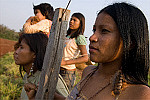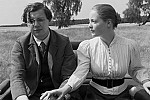 Shadows off the beaten path
Shadows off the beaten pathLITTLE SOLDIER | THE WHITE RIBBON
< < F O R E I G N > >
last update 27.Jul.09
See also: SHADOWS FILM FESTIVAL
 R E V I E W B Y R I C H C L I N E
R E V I E W B Y R I C H C L I N E
scr Marco Bechis, Luiz Bolognesi
prd Marco Bechis, Caio Gullane, Fabiano Gullane, Amedeo Pagani
with Abrísio da Silva Pedro, Alicélia Batista Cabreira, Ambrósio Vilhava, Ademilson Concianza Verga, Claudio Santamaria, Matheus Nachtergaele, Fabiane Pereira da Silva, Chiara Caselli, Leonardo Medeiros, Nelson Concianza, Poli Fernandez Souza, Eliane Juca da Silva

release Br 28.Nov.08,
US May.09 siff,
UK 18.Sep.09
08/Brazil 1h48
VENICE FILM FEST


 Beautifully shot and performed with the authenticity of a documentary, this involving drama has a lot to say about human progress in rural Brazil, although its off-handed story and slow pace might alienate some audiences.
Beautifully shot and performed with the authenticity of a documentary, this involving drama has a lot to say about human progress in rural Brazil, although its off-handed story and slow pace might alienate some audiences.
Osvaldo (Pedro) is a young Guarani whose dreams seem to be coming true, so he begins his training as a shaman. But a nasty event spurs the leader of the nomadic group, Nadio (Vilhava), to move to a new location on the side of a large farm owned by a man of European descent (Medeiros). This sets the two communities in conflict: the wealthy landowners and the indigenous people who are watching their land and lifestyle disappear.
Filmmaker Bechis sharply captures the realities of life in this part of the world, with its blend of old and new customs. For the Guarani, the spirits live among them, and they adapt to modern life even as they retain their traditions. Their rich history gives them the right to cross private land to get to their hunting grounds--after all, it belonged to them before the foreigners stole it. And these kinds of clashes are only part of the story.
The film is punctuated by eerie suicides, as bodies of young people are found hanging in the jungle. Is this indicative of frustration and hopelessness about the future? Is it a protest against injustice? Or is it a symptom of the emptiness of a people group that has lost its way? Whatever it is, the images are thoroughly haunting and unsettling, and subtly remind us of the pointless deaths of young people in our Western cities.
And it's this kind of insight that makes this film vitally important. Not only is it a compelling little drama, packed with characters who are vivid and involving (the women are hilariously matter-of-fact), it's also a clever "eco-drama", looking at big issues of global economy and social justice. And beyond that, it captures something even more profound about human nature and the need for connection and respect.
18.May.09
 R E V I E W B Y R I C H C L I N E
R E V I E W B Y R I C H C L I N E
scr Antoine Jaccoud, Olivier Lorelle, Ursula Meier, Gilles Taurand, Raphaelle Valbrune
prd Denis Delcampe, Denis Freyd, Thierry Spicher, Elena Tatti
with Isabelle Huppert, Olivier Gourmet, Adélaide Leroux, Madeleine Budd, Kacey Mottet Klein, Renaud Rivier, Kilian Torrent, Nicolas Del Sordo, Hugo Saint-James, Virgil Berset, Ivailo Ivanov, Marc Berman
 release Fr 29.Oct.08,
release Fr 29.Oct.08, US 1.May.09,
UK 7.Aug.09
08/France 1h37
CANNES FILM FEST

 With this playful fable, filmmaker Meier takes a clever look at family life by placing the characters in a surreal location and then twisting things outrageously. And terrific acting makes it surprisingly resonant.
With this playful fable, filmmaker Meier takes a clever look at family life by placing the characters in a surreal location and then twisting things outrageously. And terrific acting makes it surprisingly resonant.
Marthe and Michel (Huppert and Gourmet) live in idyllic isolation on an unfinished highway with their three children: snarky sunbather Judith (Leroux), obsessive teen Marion (Budd) and lively young Julien (Klein). But their quiet life is about to be shattered when, after 10 years, Route E57 is finally opened. Suddenly, they're cut off from work and school by a crowded, high-speed motorway. But while Marion frets about pollution, Marthe refuses to leave her beloved home, leaving Michel no choice but to take drastic action.
Gorgeously shot by the gifted Agnes Godard, the film has a quietly shifting style that almost subliminally moves from relaxed and comical to harrowing and scary. This is a family that's unable to control its own destiny, no matter how hard they try. And it's thoroughly gripping to watch their good-natured banter and matter-of-fact pragmatism give way to desperation, infighting and instability.
Fortunately, the cast is so natural that this never becomes depressing. And the comical/metaphorical approach keeps us from taking it too literally. The result is that it gets well beneath our skin in a way we don't quite expect. When the emotions come, they rattle us almost as much as the other characters. And this also allows the cast, especially Huppert and Gourmet, to give layered performances. While the remarkably unselfconscious Klein offers us a blast of fresh hope from start to finish.
There are all kinds of issues swirling around, and Meier inventively creates an almost post-apocalyptic atmosphere in which this could be the last family on earth. We experience the noisy joy of life outside the rat race, the invading "alien" road workers, the expectation and dread of the first car, the cacophony of traffic, the claustrophobic squalor of the final act. All of this tests the resilience of this family unit in evocative and thoroughly engaging ways. Will they survive? Can they let go of the past and move on? Is isolationism a realistic option?
9.Jul.09
 R E V I E W B Y R I C H C L I N E
R E V I E W B Y R I C H C L I N E Lille Soldat
Lille Soldat
scr Kim Fupz Aakeson
prd Ib Tardini
with Trine Dyrholm, Lorna Brown, Finn Nielsen, Rasmus Botoft, Thure Lindhardt, Henrik Prip, Jens Jorn Spottag, Louisa Yaa Aisin, Victoria Agami, Henrik Jorgensen

release Den 14.Nov.08,
UK Jun.09 eiff,
US 7.Jun.09 siff
08/Denmark Zentropa 1h40


 This Danish drama continually shifts and changes until we're not sure where it's going. But what emerges is a remarkably involving story of two women trying to be themselves in a world that constantly puts them in boxes.
This Danish drama continually shifts and changes until we're not sure where it's going. But what emerges is a remarkably involving story of two women trying to be themselves in a world that constantly puts them in boxes.
Lotte (Dyrholm) returns to Denmark following a tour of duty in Iraq. She's not in the mood to do anything, but her father (Nielsen) enlists her help in his business. Well, not his main job managing a garage, but his side-role as a pimp for illegal immigrant prostitutes from Nigeria, specifically Lily (Brown), who's also his girlfriend. Lily isn't so sure about having a female driver-bodyguard until she witnesses Lotte's military training in action. And as they begin to become tentative friends a problem emerges in Lotte's impulse to save Lily.
These women have lively, prickly personalities that come through beautifully on screen. Both are strong figures who are used to looking out for themselves, so they naturally clash even as they see something in each other that they like. And director Olesen allows this strong self-reliance to be expressed in quiet moments rather than bog, obvious action. This also allows the film to develop a playful, warm tone that engages us completely.
Dyrholm and Brown are a terrific double act, cleverly revealing these terrific female characters in unexpected ways. It's a joy to watch them interact, as Lily grills Lotte on her military experiences, then Lotte turns the tables by quizzing Lily about the daughter she left behind. Both of them have remarkably steely eyes, and the film softens along with them by way of scenes that are grisly and scary as well as hilarious and powerfully emotional.
The film's simple storytelling belies what's actually a complex plot that tenderly addresses some huge issues from very personal angles. There's a palpable sense that both women are seeking some kind of redemption, but neither can help the other one, no matter how they might try. Lotte especially has trouble seeing any shades of grey in the world around her, resorting to violence as the answer to any conflict. And it will take her a bit longer to realise that, not only can't she fix Lily's situation, but she's the only one who can sort herself life out.
18.Jun.09
 R E V I E W B Y R I C H C L I N E
R E V I E W B Y R I C H C L I N E Das Weisse Band
Das Weisse Band
prd Stefan Arndt, Veit Heiduschka, Michael Katz, Margaret Menegoz, Andrea Occhipinti
with Christian Friedel, Leonie Benesch, Ulrich Tukur, Ursina Lardi, Josef Bierbichler, Gariela Maria Schmeide, Maria-Victoria Dragus, Leonard Proxauf, Burghart Klaussner, Steffi Kühnert, Rainer Bock, Susanne Lothar
 release UK Nov.09,
release UK Nov.09, US 25.Dec.09
09/Austria X-Filme 2h24
Palme d'Or:
CANNES FILM FEST

 Grim, long and very bleak, Haneke's Cannes-winner isn't the most accessible of his films. But it's strikingly well-made, with a riveting series of events and a growing sense of depth that makes it disturbingly relevant on several levels.
Grim, long and very bleak, Haneke's Cannes-winner isn't the most accessible of his films. But it's strikingly well-made, with a riveting series of events and a growing sense of depth that makes it disturbingly relevant on several levels.
In a small German village before the Great War, most of the residents work for the local baron and baroness (Tukur and Lardi), including the young schoolteacher Lehrer (Friedel) who narrates the tale as an old man (voiced by Ernst Jacobi). He takes us through a series of enigmatic events that begin when the doctor (Bock) is injured by a deliberately placed trip wire, and the following days see sudden deaths, mysterious torture, disappearances and vandalism. Meanwhile, Lehrer is wooing a young nanny (Benesch) whose family won't make things easy for him.
Haneke's astute direction and Christian Berger's spectacularly detailed monochrome cinematography make this feel like a timeless classic. The film's striking starkness echoes the strict religiosity of the villagers, especially the frighteningly stern pastor (Klaussner) who ties a white ribbon to his children (Dragus and Proxauf) to remind them to stay pure. Life here has an unbending hierarchy in which the men are masters and can much do what they like with women and children.
Haneke's chilling message is that the sins of the fathers are repeated by the next generation. And he also takes a relevant look at what misuse of political and social power can do to any community. It's like this village is standing in for the whole 21st century world, with its mass paranoia and the violent actions of the dispossessed. Not to mention the secret moral depravity of those who appear most upright.
There are a huge number of characters in this film, and it's not easy to keep track of how they all fit together. Some scenes sparkle with wit, but many are tinged with tragedy. Most memorable is the scene in which a young nanny talks to her very young charge about death and realises the control this gives her over him. In the end, the central mystery becomes thoroughly haunting, as Haneke infuses everything with an unnerving coldness that comes straight from the culture itself. It's a seriously immersive film experience that will be impossible to forget.
24.Jul.09


See also: SHADOWS FILM FESTIVAL
© 2009 by Rich Cline, Shadows
on the Wall